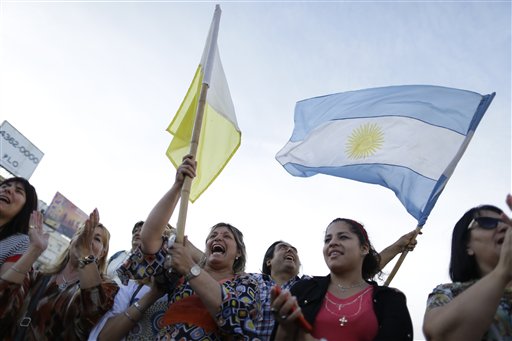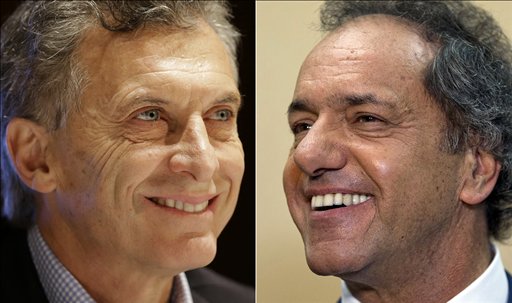In a presidential election that could have economic and political ramifications across South America, Argentines on Sunday were weighing issues ranging from soaring prices to the future of social welfare programs implemented by the left-leaning President Cristina Fernandez and her late husband.
Opposition leader Mauricio Macri, who campaigned on promises to reform and jumpstart Argentina’s economy, went in as the front-runner after his unexpectedly strong showing in the Oct. 25 first round that forced a runoff against Daniel Scioli, the president’s chosen successor.
Scioli, who had been expected to win by 10 or more points in last month’s six-candidate election, tried to regain momentum by frequently attacking Macri before the runoff. He said a Macri victory would subject this nation of 41 million people to the market-driven policies of the 1990s, a period of deregulation that many Argentines believe set the stage for the financial meltdown of 2001-2002.

Supporters of opposition presidential candidate Mauricio Macri cheer as they wait for official results in Buenos Aires, Argentina, Sunday, Nov. 22, 2015. (AP Photo/Natacha Pisarenko)
“This government has helped a lot of people with the social welfare plans,” said Carlos Mercurio, a 55-year-old newsstand owner who voted for Scioli. “I’m afraid of what Macri might do.”
Macri has rejected the notion that he represents policies of the past, saying he would lead with “21st century development” as opposed to “21st century socialism” — a term used by supporters of the late Venezuelan President Hugo Chavez and his successor, Nicolas Maduro.
“The dirty campaigning against Macri has been so aggressive,” said Marcela Zamora, 42, who voted for Macri after supporting one of the other four candidates in the first round. “I just want (the ruling party) gone.”
Soon after the polls closed, exit polls projected that Macri would win the election. Argentine law does not permit exit polls to release percentages until 9 p.m. local time. However, they are allowed to project a winner when polls close. The exit polls are done by media companies such as C5N and Canal America. Initial results from electoral authorities are not expected until later Sunday.
The election comes at a time when Argentina’s economy, Latin America’s third largest, has stalled. Inflation is around 30 percent, gross domestic product growth is just above zero and many private economists warn that the Fernandez administration’s spending is not sustainable.
Story by the Associated Press
Joseph Humire of Center for a Free Society discusses Argentine elections
CCTV America’s Susan Roberts interviewed Joseph Humire, executive director for the Center for a Free Society about Sunday’s elections.

 CGTN America
CGTN America FILE – This combo of file photos show opposition presidential candidate Mauricio Macri, left, during a city police ceremony, Oct. 28, 2015, and ruling party presidential candidate Daniel Scioli at a press conference, Aug. 10, 2015, both in Buenos Aires, Argentina. (AP Photo/Victor Caivano, Natacha Pisarenko, File)
FILE – This combo of file photos show opposition presidential candidate Mauricio Macri, left, during a city police ceremony, Oct. 28, 2015, and ruling party presidential candidate Daniel Scioli at a press conference, Aug. 10, 2015, both in Buenos Aires, Argentina. (AP Photo/Victor Caivano, Natacha Pisarenko, File)
